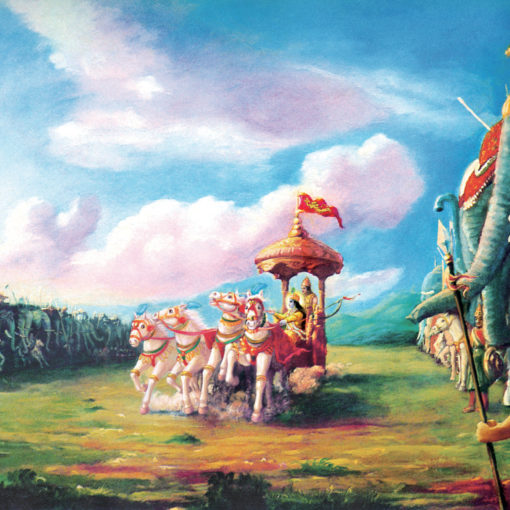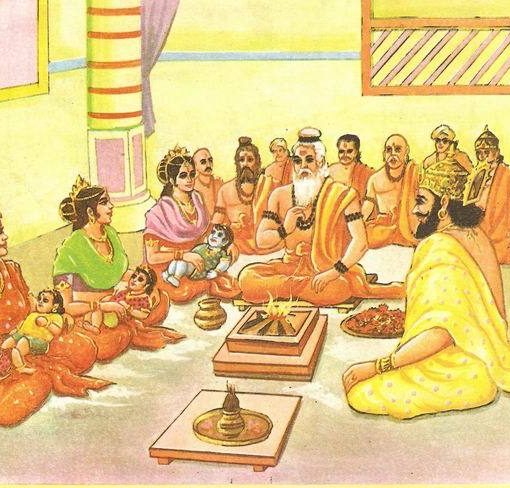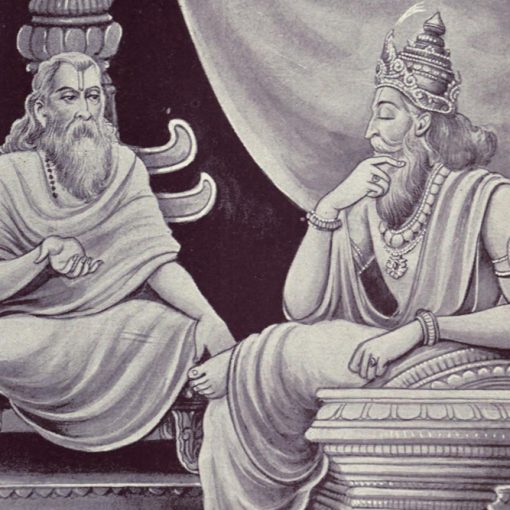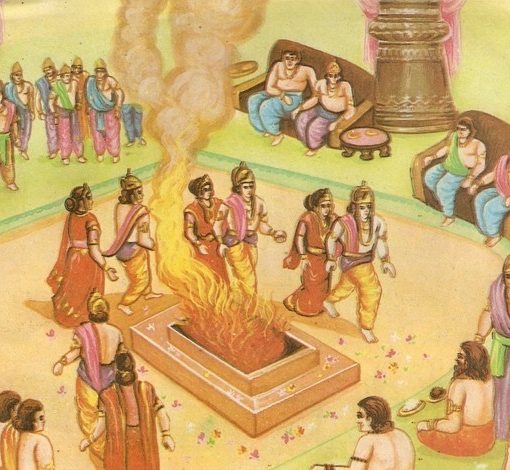



Daśaratha quickly went with his ministers to greet the sage, even as Indra might greet Brahmā. As soon as he saw Viśvāmitra standing at his door, the king respectfully brought him in, sat him down and personally washed his feet. Standing with folded palms before the sage, Daśaratha was thrilled with joy as he spoke. “I consider your arrival here to be as welcome as the obtaining of celestial nectar in one’s own hands, as rainfall arrived in a desert, as the birth of a child to a childless couple or as the recovery of a lost treasure. What can I do for you today?”
Daśaratha was aware of Viśvāmitra’s glory. The sage was famous all over the world for his performance of difficult austerities and his virtuous behavior. He was also well known for his almost limitless powers. Once, by his own ascetic power, he had created an entire constellation of planets which still shone in the southern sky. The king felt honored to see him and wondered what had brought him to Ayodhya. Sitting at Viśvāmitra’s feet, Daśaratha continued to address him.
“You are worthy of my service in every way and it is by great good fortune that you have called at my door. My night has ended in a splendid sunrise as I see here before me the best of the Brahmin sages. Simply by seeing you I have received a blessing equal to the results of visiting every place of pilgrimage. I wish now to perform some pleasing work for you, O noble sage, and you may consider it already completed. As a guest, you are as good as God to me, and I shall not hesitate to do anything you desire.”
Addressed in such a delightful way Viśvāmitra felt joy as he replied to Daśaratha. “Your speech has pleased me in every way, O tiger among kings. You are descended from proud ancestry and have been instructed by the god-like sage Vasiṣṭha. Make a firm resolve to satisfy my desire and prove true to your promise, O virtuous one.”
Viśvāmitra had walked for three days without eating or sleeping, his mind fixed on his purpose. His body was lean and powerful, golden colored and covered by a black deerskin. He held in his hands a staff and a waterpot, his only possessions. He had come to ask something from Daśaratha which he knew would be hard for the king to grant. The sage gazed steadfastly into Daśaratha’s eyes as he spoke.


Daśaratha listened intently as the sage spoke. He knew that Viśvāmitra would not have come to him, the emperor of the earth, unless there was some difficult task at hand. The Rākṣasas were dangerous beings who hated sages. The king knew they had been increasingly disruptive, and this was now confirmed by Viśvāmitra.


The king’s mouth fell open. He gazed in horror at Viśvāmitra. Was he serious? Send Rāma? The prince was just a boy! He had never seen action on the battlefield. Of course, there was no doubting His bravery and prowess, but how could He face the Rākṣasas? Those vicious beings knew every kind of sorcery. They could contend with even the gods. What chance would a youth like Rāma stand against them?


Viśvāmitra fell silent. He was aware of Rāma’s true identity. By his meditations the sage could see in his heart the Supreme Lord, and he knew Rāma to be that same person. Viśvāmitra understood that the annihilation of the demons was a part of Rāma’s plan on earth. The sage was acting only as an instrument of the Lord’s desire.
Daśaratha stood mortified, oblivious to the divinity of his young son, overpowered by grief at the prospect of losing his young son Rāma. Trembling all over, the king felt pained at heart and fell unconscious to the ground. Remaining senseless for some time, Daśaratha finally came round and said to the sage, “My lotus-eyed son is less than sixteen years old. How then can He fight with the Rākṣasas? I myself, marching at the head of hundreds of thousands of highly trained soldiers, shall personally come to wage war on the demons. Do not take Rāma!”
Daśaratha sought desperately to change Viśvāmitra’s mind. For as long as he breathed, he said, he would stand with bow in hand and beat back any Rākṣasas who came to attack Viśvāmitra’s sacrifice. The sage need have no doubt. Daśaratha wailed piteously, “The Rākṣasas are given to treacherous fighting. The inexperienced Rāma is still not fully trained. He is yet unable to estimate the strength or weakness of the enemy, nor is He familiar with the use of the celestial weapons necessary for dispatching such powerful enemies as Rākṣasas.”
Daśaratha knelt before the sage. He looked up at him with tears in his eyes. Seeing Viśvāmitra’s resolute expression he took hold of his feet and implored him to relent. He tried to think of life without Rāma. It was unimaginable. After such a long time and so much prayer he had finally obtained a son worthy to succeed him. And such a son! It seemed that with each passing day Rāma endeared Himself more to his elders with his virtuous behavior. Now He was just attaining maturity and could soon be installed as Prince Regent. How could he lose Rāma now? He continued his plea, “Separated from Rāma I doubt I shall survive for even an hour. Please do not take Him or, if you really must, then please also allow me to go with Him. Taking my entire army I shall station myself on the battlefield and ward off the demons. Tell me all that you know about those Rākṣasas, O sage, and I shall make every preparation.”


Hearing Rāvaṇa’s name, the king became alarmed. He stood up suddenly. “Even the gods and Gandharvas united with the entire heavenly host cannot defeat that demon. How then shall I, a mere mortal, stand before him? What then of Rāma? Brahmā has made Rāvaṇa unslayable. I with all my troops will prove incapable of overcoming Rāvaṇa, who deprives even the most powerful fighters of their prowess on the battlefield.”
The king had heard numerous accounts of Rāvaṇa’s exploits. Many years ago the demon had slain Anaranya, his ancestor. The demon had defeated the gods and had even once fought and overcome the mighty Yamarāja. To confront him in battle was more or less suicide. The king clasped his hands together. “How can I permit my gentle son to go out? Under no circumstances can I allow Rāma to risk his life against Rāvaṇa. Rather, I shall go out myself with my army to protect your sacrifice, even if it means my death. Rāma shall remain here.”
Hearing Daśaratha’s faltering speech, Viśvāmitra blazed up with anger. Did Daśaratha have no faith in him? How dare he refuse his request! Kings and warriors must always respect and obey Brahmins, for this was the sacred law. And Daśaratha had already promised to satisfy him. The sage’s eyes opened wide with fury as he spoke.
Seeing Viśvāmitra seized with fury, the gods themselves became fearful and the earth shook. The wise Vasiṣṭha, perceiving the imminent danger from Viśvāmitra’s curse, spoke to the king. “Born in the line of the sun-god, you are like virtue personified. It does not befit you to abandon righteousness. You always remain firm in your vows and are famed as being fixed in truth. Summon strength from within yourself now. If you fail to redeem your promise, you will lose all the merit that has accrued to you from the performance of pious acts. Send Rāma with Viśvāmitra. Whether or not Rāma has mastered archery is of no consequence, as He will be protected by the sage.”
Vasiṣṭha, who also knew Rāma’s divine plan, looked at the agonized king. He told him how Viśvāmitra had inconceivable power and great learning. Formerly, while ruling over a kingdom, he had received from Śiva the knowledge of every celestial weapon. He would undoubtedly give this knowledge to Rāma. Although quite able to punish the Rākṣasas himself, Viśvāmitra had asked for Rāma only to do good to the prince.
Daśaratha still appeared doubtful. His hands shook as he folded them, imploring Viśvāmitra to relent. Tears streamed from his eyes.
Vasiṣṭha then took the king aside and spoke in confidence. He told him of Rāma’s identity. He also said that the arrival of Viśvāmitra had been arranged by Providence for the good of the world. The king should therefore have no fear in sending Rāma with the sage.




Reference: Ramayana – Krishna Dharma Das https://www.vedabase.com/en/rkd/1/2





